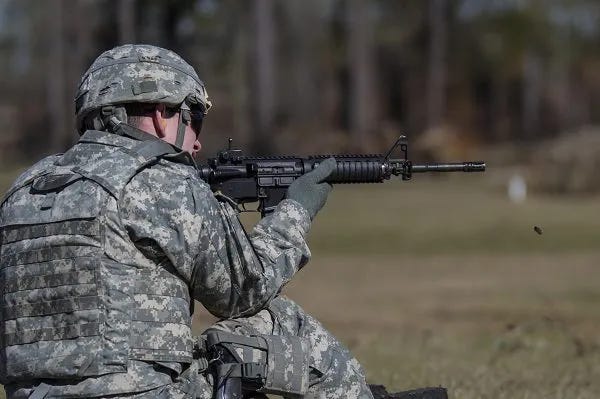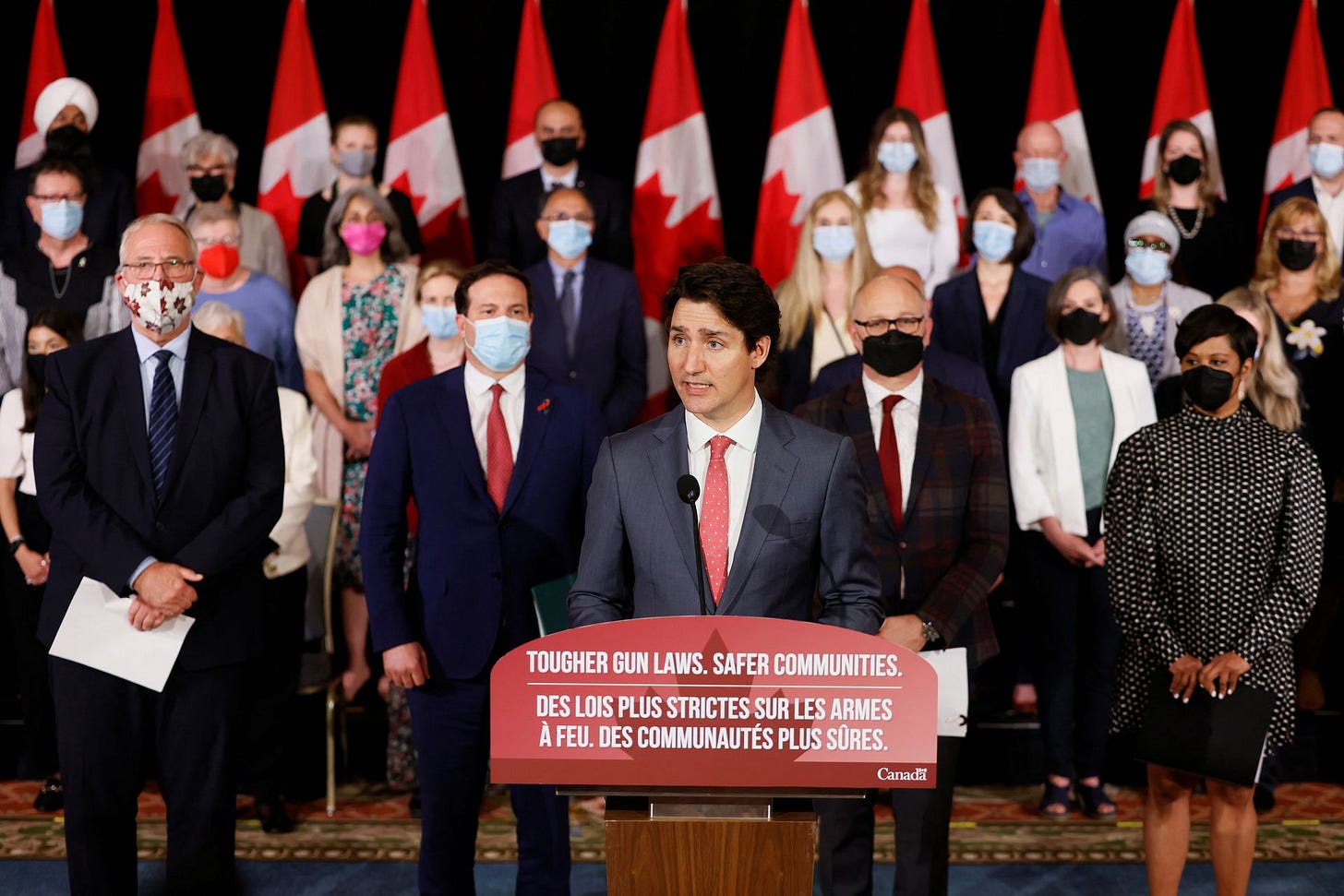A Sad Story of Sensible Gun Legislation
Here it comes again: the usual litany of partisan gun control bills following another tragedy. Here's one they could have passed nine years ago that might have worked.
It’s official: House Democrats, acting on a purely partisan basis, are trotting up their poll-tested “best of” legislation to restrict gun ownership. The House Judiciary Committee is holding an “emergency hearing” on Thursday to “mark up” the bills. Any GOP efforts to modify the bills in any way will be rejected. Oldies but goodies, politically speaking.
Are you one of the thousands of teenagers in Pennsylvania who enjoy the opening of hunting season - a school holiday in many parts of the Commonwealth? If you are 19 years old and looking to buy a new .30-06 caliber rifle for that hunting trip - more powerful than the scary-looking AR-15 that is generally unsuitable for large game hunting - the Democrats say no. Even if you pass your background check and just completed basic training for the Pennsylvania Army National Guard. Where you were trained to handle really scary-looking guns. Even grenades.
According to Punchbowl News:
The omnibus package includes bills to raise the purchasing age for semi-automatic rifles from 18 to 21; ban the import, sale, manufacture, transfer or possession of high-capacity ammunition magazines, although existing magazines are “grandfathered” in; requires existing bump stocks be registered under the National Firearms Act and bars the manufacture, sale, or possession of new bump stocks for civilian use; amends the definition of “ghost guns” to require background checks on all sales, as ATF is trying to do through rulemaking; beefs up federal criminal penalties for gun trafficking and “straw purchases”; and establishes new requirements for storing guns at home – especially with minors present – while providing tax credits for storage devices.
Some of these might be good ideas in theory, but frantically crafted legislation rushed to the floor usually contains errors of omission and commission. You know, unintended consequences. And none of them, with one possible exception, has anything to do with the most recent mass shootings.
Meanwhile, legislation crafted in response to the horrible Sandy Hook school shooting in 2012 that might have actually prevented the Sutherland Hills church shooting in Texas five years later - the worst such shooting in history - was never passed by Congress.
It died from a Senate Democratic filibuster, even though nine Democrats supported the bill, and was supported by 52 Senators. It lacked 60 votes to end debate (that pesky filibuster rule).
It’s known as “Grassley-Cruz,” after its authors, Sens. Chuck Grassley (R-IA) and Ted Cruz (R-TX). The legislation was reintroduced 13 months ago. Maybe it will be part of a bipartisan legislative response by the US Senate to the most recent senseless tragedy in Uvalde, Texas. Since the facts aren’t all in, it’s early to know if any bill - or any law now on the books - would have prevented the evil shooter’s rampage. But serious flaws in the enforcement of existing laws are the first place policymakers should look, and there’s evidence that it matters.
Grassley and Cruz did that after Sandy Hook, and they kept working. After the Sutherland Hills shooting, they discovered several flaws in the federal government’s, including the Obama Administration’s, enforcement of gun safety laws and programs.
They discovered, for example, that the 2017 Sutherland Hills church shooter should have failed his background check for prior incidences of domestic abuse while serving in the US Air Force. Which never submitted the information to the National Instant Criminal Background Check System (NICS). As bad, the Obama Administration failed to prosecute some 48,000 people who illegally attempted to purchase guns - prosecuting only 44 of them - while proposing cuts in school safety funding. It has gotten no better.
“The failure to fully employ the national background checks system has come at the cost of lives. Over the last several years, a number of mass shootings and deaths could have been prevented had our current background check systems worked properly. Our bill will improve that system to ensure the NICS system receives the information it needs to keep firearms out of the hands of people who pose a danger to themselves or others. It does that without burdening the Second Amendment rights of Americans,” Grassley said. “When we first introduced this legislation in 2013, after the tragedy at Sandy Hook, it received a bipartisan majority vote in the Senate. There’s no reason that can’t happen again.”
“When Sen. Grassley and I introduced this bill nine years ago, it received the most bipartisan support of any comprehensive gun legislation. Unfortunately, Senate Democrats recklessly blocked it. Our bill seeks to increase support for school safety funding, ensure agencies accurately submit records to the NICS, and develop a federal task force to prosecute criminals who illegally purchase a firearm, rather than target law-abiding citizens – as the Biden administration has continually signaled they intend to do. I am honored to continue the fight to keep guns out of the hands of violent felons, fugitives, and those with severe mental health issues that endanger themselves and those around them. I once again urge my Senate colleagues on both sides of the aisle to come together with us to prevent future tragedies,” Cruz said.
It is no secret that Democrats and the Left are focused on eliminating guns, despite that pesky Second Amendment. US Senator Diane Feinstein (D-CA) said previously: "If I could have gotten 51 votes in the Senate of the United States for an outright ban, picking up every one of them (assault weapons) … Mr. and Mrs. America, turn 'em all in, I would have done it."
Canada’s Liberal Prime Minister, Justin Trudeau, probably did US Democrats no political favors on Memorial Day when he promised legislation to end the sales and transfers of handguns in his country and outlaw magazines with more than five rounds. It would also ban “look-alike” guns, including air-soft toys. Paintball guns can’t be far behind. After all, no one “needs” such toys, no doubt evidence of “toxic masculinity,” you’ll no doubt hear. Canada has no constitutional right for citizens to bear arms. Maybe paintball isn’t a thing in Canada.
Much is also being said about whether the second amendment is “absolute.” Constitutional rights are not unlimited. The US Supreme Court has repeatedly allowed states and the federal government to place reasonable restrictions on the time, manner, and place of constitutional rights. The famous District of Columbia vs. Heller case of 2008 is a good example. The District tried to ban handguns, period. The court said no. The late Justice Antonin Scalia, writing for a 5-4 majority in the 2008 Heller decision:
Like most rights, the Second Amendment right is not unlimited.
It is not a right to keep and carry any weapon whatsoever in any
manner whatsoever and for whatever purpose: For example, con-
cealed weapons prohibitions have been upheld under the Amendment
or state analogues. The Court’s opinion should not be taken to cast
doubt on longstanding prohibitions on the possession of firearms by
felons and the mentally ill, or laws forbidding the carrying of fire-
arms in sensitive places such as schools and government buildings, or
laws imposing conditions and qualifications on the commercial sale of
arms.
Others point to Australia’s gun confiscation scheme implemented by former Prime Minister John Howard and his right-leaning Liberal Party in 1996, including a gun “buy back” program with very limited success. Today, more guns are in circulation (3.8 million) in Australia today than in 1996 (2.5 million) when gun control was initiated with little evidence that it has reduced gun violence. Never mind the fact that a mandatory “buy back” scheme would be unconstitutional in the U.S.
While no legislation or law is perfect, Grassley-Cruz was narrowly crafted. After all, school shooters haven’t been stopped by the 1990 Gun-Free School Zones Act. Grassley-Cruz would have addressed gaping holes in the enforcement of gun laws. And Senate Democrats killed it.
It is too early to tell what a bipartisan group of US Senators may come up with. Senator Chris Murphy, D-CT, to his credit thus far, seems focused on finding what can actually pass the Senate with at least 60 votes. It may include limits on the types of guns people under 21 are allowed to buy as if that will stop them. It may include an inducement for so-called “red flag” laws that could help keep guns out of the hands of dangerous people (although they didn’t work with the grocery store shooter in Buffalo, New York in May). It might include expanding background checks, which the Ulvade shooter passed. It is likely to include funding to “harden” schools and provide a similar level of protection found in most county courthouses. The devil will be in the details.
The idea that limiting entrances at schools would somehow run afoul of fire safety rules doesn’t make sense to me. There is a difference between entrances and exits. Courthouses and many other buildings limit entrances with no fire safety issues. You’ll note that many of the same people arguing against school “hardening” also support broad gun control and confiscation.
Using Centers for Disease Control data, it has been projected that between 500,000 and 3 million defensive gun uses to prevent crime has occurred (we really don’t know). The Crime Prevention Research Center routinely documents between 20 and 30 such occurrences every month since December. Including one last week in West Virginia.
We have much to learn still about the massacre in Uvalde. There appear to have been tragic errors on several levels, from an entrance being propped open to a missing school resource officer and the initial police response. We must wait for the facts. In the meantime, we should also look into a consistent pattern that has emerged among these shooters - alienated young males, often fatherless - and how media coverage of previous shooters (see: Columbine) has inspired copycats.
We have a lot of work to do, and it begins by first doing no harm. May wiser heads prevail. Some things can’t be fixed by legislation. Your cynicism that it will is justified.






